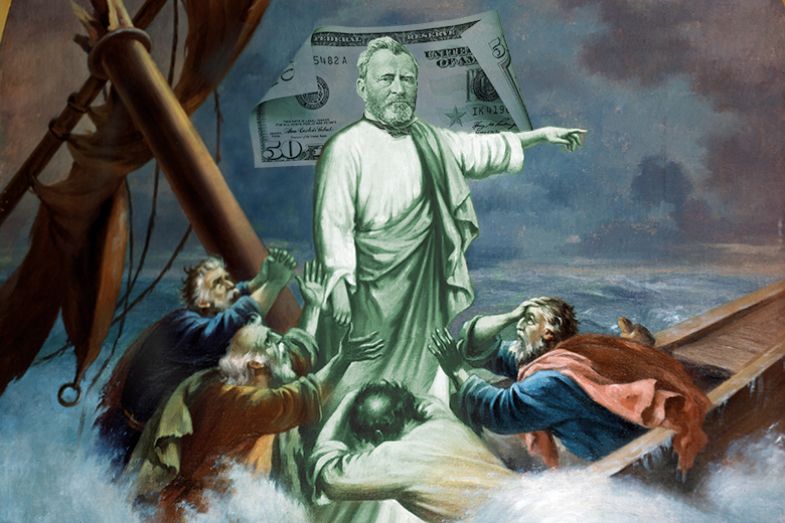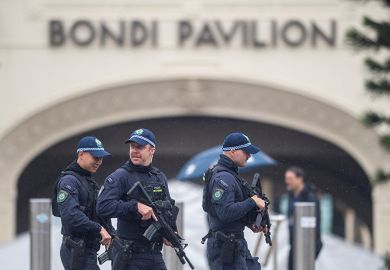Ángel Cabrera has set an almost impossible task for himself – and the rest of higher education.
As president of George Mason University – perennially the leading academic beneficiary of conservative impresario Charles Koch – Cabrera has promised to answer the relationship’s countless critics by enacting clear written guidelines for protecting the university’s academic freedom.
“Everybody wants this,” he tells Times Higher Education. Existing policies for vetting donations at the Virginia public university are “very vague” and “put fundraisers and deans at risk, because they have to apply their own judgement about what they think is acceptable”.
His desire for a ceasefire in the long-running Koch wars is understandable. Charles Koch is a political lightning rod: as great a bogeyman figure for the Left as the billionaire investor philanthropist George Soros has become for the Right. Alongside his equally wealthy brother David, he has used his estimated $50 billion (£39 billion) fortune to create and coordinate a maze of conservative activist efforts both overt and clandestine, guiding like-minded wealthy donors in their support of thinktanks, political lobbying organisations, grassroots-style pressure campaigns and more. The network planned to spend nearly $400 million on this year’s midterm elections alone.
While George Mason is by far the biggest recipient of Koch’s academic funding, having received about 20 times more than any other institution, it is not alone in hoping to keep the money flowing while avoiding the taint.
The Koch case also shines a more general spotlight on the potentially problematic nature of donations from entities with particular ideological stances. Australian universities have undergone similar agonies over whether to accept donations from the Ramsay Centre for Western Civilisation, which is associated with several prominent right-wing politicians, to fund a course in Western civilisation. The course’s exclusive focus on Western civilisation has been decried by many academics and the Australian National University backed out last summer on the grounds that the centre was seeking to impose “extraordinarily prescriptive micromanagement” and to have a “controlling influence” on curriculum design and staff appointments. Last month, the University of Wollongong ran into controversy after becoming the first institution to accept the A$50 million (£28.5 million) on offer for the degree and associated scholarships without consulting its academic senate or university council.
Back in the US, the Charles Koch Foundation – the industrialist’s unit for managing his university donations – now donates more than $60 million a year to US higher education institutions, benefiting nearly 300 campuses. And, like George Mason, many of those campuses are being forced by prolonged student and faculty protests and court battles to decide how much of it is worthwhile.
The protesters may be winning, in the sense that George Mason is among many universities now making clear that academic interference of the type seen from the Koch Foundation will not be tolerated. But as decreased government support increasingly forces US universities to look for alternative sources of income, outside funders’ desire for some kind of control over how their money is spent is also increasing, observers suggest – and watchdogs may find it even harder to identify and flag up such influence when it occurs.
“Donors want to be engaged in their philanthropy more than they have been, and that goes beyond higher education,” Laurie Leshin, president of Massachusetts’ Worcester Polytechnic Institute, told reporters at a recent academic roundtable. That requires his institution to be “thoughtful about every gift that we get, and how we handle it”.
So far, he said, he has not encountered any major problems. But Mark Becker, president of Georgia State University, told the roundtable that unacceptable donor demands had led him to turn down at least two multimillion-dollar gifts. “We just said no,” he said.
Texas Tech University had a similar experience, according to its president, Lawrence E. Schovanec, refusing a $15 million gift because the donor wanted it to hire a particular academic to its faculty. “I think that, in due course, that [donor] will come around,” Schovanec added.
In many cases, the pushback has broad support. Dwayne Nellis, president of Ohio University, said he wouldn’t allow any donor to have academic input because “our faculty would be rioting – they don’t want anything to do with anything like that”. In other cases, continued external vigilance appears critical. F. King Alexander, president of Louisiana State University, said he recognises that the records of any public institution are subject to potential public disclosure. “Because of you guys,” he said, referring to journalists, “we’re not going to get caught in that web.”
That web has entangled the Koch Foundation in recent years, calling into question its long insistence that it intends no academic control. A series of disclosures about both its contracts with its partner universities and speeches by Koch-financed academics have revealed foundation beneficiaries openly pursuing Koch political objectives – and trying to recruit others to do the same.
In one case, University of Kansas students successfully sued to obtain donor contracts involving Arthur P. Hall, a business school lecturer who was one of the nation’s top recipients of Koch family money. The documents revealed that Hall had pitched a research project that publicly would look like a routine study of local population shifts, but whose real aim, he promised, would be to “promote smaller government”, largely by finding examples of what can go wrong when taxpayer money is used to guide economic growth.
Several more such examples were revealed at the 2016 conference of the Association for Private Enterprise Education, a popular gathering point for Koch-funded academics. There, the watchdog group UnKoch My Campus recorded professors describing themselves as using the foundation’s money to secretly wage ideological warfare on their campuses. There was also a presentation in which the Koch Foundation’s director of university investments, Charlie Ruger, told an audience of funded professors that he wanted to see their ideas applied “across sort of an integrated structure of production for culture change”.
Other sessions included professors from Alabama’s Troy University bragging that they had been using funds from a Koch-backed Center for Political Economy on campus to in effect “take over” some Troy academic programmes.
“We’ve had an administration that has kind of let us get away with a lot, as far as hiring people very rapidly and ramming through some of the curricular kind of stuff,” one of the professors, George R. Crowley, then chair of Troy’s economics department, told the conference.
The public university’s chancellor, Jack Hawkins Jr, responded by ordering the removal of Crowley’s chairmanship. After receiving more than $1 million in Koch Foundation support since 2010, Troy has taken nothing since the 2014-15 academic year.
George Mason, with its record $129 million in Koch Foundation support since 2005, has been home to an especially active opposition. That resistance includes a student-led lawsuit seeking public access to the university’s donor agreements. Cabrera’s responses include an internal review that found several instances in which donor contracts – signed before he arrived in 2012 – gave the Koch Foundation some level of input into faculty hiring and retention.
John C. Hardin, director of university relations at the Charles Koch Foundation, answered that with a written acknowledgement that such conditions existed, and a promise that they no longer will. Cabrera pledged to draft and implement new guidelines that would better protect the university’s academic independence.
It remains unclear, however, how much protection a written policy alone can provide institutions seeking to balance leftist opposition to influencers such as Koch and right-wing hostilities of the type that are forcing the Soros-funded Central European University to relocate from Budapest to Vienna after the Hungarian government refused to certify its legal status, leaving it unable to accept new students from January.

The challenge of donor interference goes back centuries. Some of the US’ most respected universities, including Johns Hopkins, Stanford and the University of Chicago, are themselves donor creations. It wasn’t long, said Benjamin Soskis, an expert on non-profits and philanthropy at the Urban Institute, before the controversies began. One prime example is a demand by Stanford co-founder Jane L. Stanford that sociologist Edward A. Ross be fired over a speech he gave in 1900, which was laced with anti-Asian racism.
Universities today deter such interference by setting basic rules that make some egregious donor practices and involvement clearly unacceptable, Soskis says. It does not seem possible, however, to write rules that will spare university administrators the need to make numerous yes-or-no decisions.
“That’s why they get paid the big bucks,” Soskis observes.
The Charles Koch Foundation is far from the only donor that forces universities into making tough and potentially controversial decisions. First of all, it’s still relatively small. From giving $2 million across eight campuses in the 2005-06 academic year, its donations mushroomed to $62 million across 291 campuses and related non-profits in 2017-18: the highest spending level yet. However, analysis of the foundation’s latest annual report by UnKoch My Campus reveals that while 58 new campuses received Koch funding in 2017-18, 63 others saw their support ended. That marked the third straight year in which the foundation’s departing campus partners outnumbered its new ones. Moreover, $62 million pales in comparison with the more than $50 billion in annual external funding received by US universities to fund various types of research and development.
Still, there are at least a couple of major characteristics of Charles Koch and his foundation that have attracted disproportionate attention. One is his high prominence in both business and politics, and his apparent attempts to have the latter benefit the former. A chief example involves his heavy investments in fossil fuels and other polluting industries, alongside his leading role in promoting political forces and academic voices that discount environmental protections and reject the scientific consensus on climate change.
The second is his foundation’s habit of signing donor contracts that forbid public disclosure of the terms, while placing authority over who and what the grant is spent on in the hands of on-campus political sympathisers. That combination of secrecy and power has been a rallying point for protests on various campuses, including George Mason’s.
The foundation has largely pleaded innocent, saying that its activities are separate from Koch’s corporate and political affairs; that any contractual privacy stipulations are requested by the recipient; and that it seeks only to promote a wider variety of ideas in academia.
University scholars, says the Koch Foundation’s Hardin, are the best people to decide what issues they should study and what conclusions they should draw.
Hardin has cited as his model the “Republic of Science” concept of chemist and philosopher Michael Polanyi, who imagined academic science as an economic marketplace where research dollars reach the best scholars and ideas, as determined by scientific consensus.
Yet that system already exists, in the form of peer-reviewed grant awards. By contrast, the Koch Foundation makes its own choices of academic partners and, according to Hardin, does not typically read their work. Instead, he explains, the foundation’s decisions on whether to renew grants are based largely on whether the recipient meets goals, such as numbers of students enrolling in a class or attending a speech, or the number of research publications produced.
Yet Cabrera defends the Koch Foundation as “by far one of the most hands-off” donors he has encountered. He suggests that ongoing criticisms of Koch contracts largely reflect displeasure with Koch’s personal politics. The contracts identified in the George Mason investigation “were not outrageous: they just raised questions.” Still, after learning of them, “I didn’t think those agreements were OK. I thought those agreements were problematic.”
Assessing the overall value of Koch money to his institution, Cabrera believes “we are a better university when we have a diversity of ideas”. But he denies that he is “on a quest to correct anything, or to balance anything” in terms of anti-Right bias in academia. He defends the integrity of his institution’s association with the Koch Foundation chiefly in terms of the reputational ranking of its economics department – the chief recipient of Koch funding – which is home to two Nobel laureates. “This is not a crappy, manipulated department,” Cabrera says.
Indeed, the reputational heft of Koch beneficiaries continues to grow, from a base long dominated by George Mason and smaller regional institutions with individual faculty members devoted to Koch’s libertarian affinities. The foundation’s top 30 recipients in 2017-18 included Harvard, Rice and Stanford universities, the University of Chicago and the Massachusetts Institute of Technology. And while this may give the Koch Foundation more respectability, such heavyweights also bring a stronger institutional ability to resist any ideological tug. Leaders at such institutions, with their multibillion-dollar endowments, have privately ridiculed the notion that their academic missions could be influenced by a few million dollars from a donor such as the Koch Foundation.
Yet it is not that simple. Both Charles and David Koch are MIT graduates, whose charitable gifts to their alma mater – including a $100 million donation to found the David H. Koch Institute for Integrative Cancer Research – dwarf the eight-year total of about $1 million in Koch Foundation research grants to the institute. That said, Charles Koch has been gravitating in some high-profile cases towards embracing causes traditionally regarded as liberal ones. Among the most debated is his energetic advocacy of criminal justice reform. Koch cites his frustration with the deep racial imbalances in US criminal prosecutions and sentencing, but some sceptics have suggested that, as the head of a company often penalised for environmental and ethical violations, Koch might also like to weaken the pursuit of white-collar criminals.
Koch’s allies frequently justify his involvement in higher education on the grounds that he is merely a conservative counterweight to Soros. But while Soros’ Democracy Alliance does compete in many of the same broad areas of US political influence, he doesn’t have an academic-oriented counterpart to the Koch Foundation. And while Soros’ Open Society Foundations do fund work in higher education, they generally focus on internal structural matters, such as university governance and student access, and operate almost exclusively outside the US – such as in Soros’ native Hungary.
One likely explanation for that difference in approach, according to Stanley N. Katz, professor of public and international affairs at Princeton University, is that both Koch and Soros understand that US universities are already “deeply liberal institutions”. That, Katz says, leaves Soros with little need to do what Koch is attempting within US borders.
A spokesman for the Open Society Foundations, Jonathan E. Kaplan, declined to offer any suggestions for how universities should assess outside donations, saying the foundation rejects any attempts to compare its work with that of Koch.

The Koch Foundation has made some of its own moves overseas, but it is happening very slowly. Its first and largest relationship is with McGill University in Canada, where $6,000 in grant money in 2010-11 has grown to $150,000 in 2017-18. Another eight Koch recipients can be found in Canada, Australia, the UK, Liechtenstein and China, but most receive just a few thousand dollars.
McGill does not make its Koch grant agreements public, and has faced some on-campus grumbling about the possibility of hidden political agendas. Jacob T. Levy, the professor of political science receiving Koch’s grant support, denies that. He says that the money is distributed entirely among students, often for doctoral and postdoctoral fellowships.
Levy has no overall view on whether the grant terms should be made public, but notes that McGill rules forbid any donor from choosing academic personnel, or dictating course content. He adds that Koch Foundation leaders seem very aware, from protests elsewhere, of the reputational dangers of getting anywhere close to violations on those points.
But finding the right rules to cover all donor situations may be impossible. Katz saw the overriding importance of leadership judgement in his own hiring. That story begins with a Princeton alumni group from the class of 1921 coming to the university in the late 1970s looking to endow a professorship in “free enterprise”.
Princeton’s president, William G. Bowen, said the idea didn’t fit the university’s curriculum, but suggested an alternative phrasing – “the history of American law” – that could satisfy both Princeton’s academic approach and the donors’ conservative philosophies. The donors agreed, but then asked that their funded position be offered to Robert H. Bork, then the US solicitor general, who later became a federal judge and a highly controversial and unsuccessful nominee for the Supreme Court. Bowen also resisted that idea, at least as a condition of the donation. But he agreed to mention the suggestion to the history department, which was subsequently understood to have offered the position to Bork before he instead chose to return to Yale University to teach law. Hence, the endowed professorship in the history of American law and liberty went to Katz instead.
Katz believes that Bowen “had the right principles” in seeking to protect the university’s academic interests while securing the donation. “On the other hand, in the real world, he was willing to allow the university to offer the chair to Bork, which is what the donors wanted. I think that’s the important process: it’s not so much the principle, frankly, as the way it’s carried out.”
That sentiment appears to have general support on both sides of the Koch debate. McGill’s Levy believes that for the purposes of weighing whether to accept proposed donations, “you have to have university administrators who have a good sense of the academic mission and are able to exercise good judgement about what’s game-playing and what’s not”.
Samantha Parsons, director of campaigns at UnKoch My Campus, feels very much the same. In the case of George Mason, she says, Cabrera clearly acknowledges the unacceptable nature of the institution’s past contracts, which gave the Koch Foundation a hand in academic-related decisions. Beyond that, she continues, universities in general will need to find some way – preferably qualified experts using a common vetting process – for making case-by-case assessments of complicated donor proposals.
Most US universities already have a single system for evaluating grants in the hard sciences, she says: “A win, to us, would be to see similar processes in place for philanthropic gifts.”
In discussing his pledge to protect his deans from having to make invidious decisions about donations, Cabrera doesn’t directly rule out implementing some form of internal expert review. But he struggles to imagine what such a system might look like. Ultimately, he says, he’s concerned that it would, in effect, require a group of university reviewers to rule on the ideology of proposed grants.
“That is a political committee,” he says. “And I’m never going to accept that.”
Such ideological policing could also play into the hands of those who see universities as intolerant of conservative viewpoints. In such febrile political times, universities would probably be very wise to avoid giving their detractors such ammunition. The outcome of Charles Koch’s quarter-billion-dollar investment in US higher education appears likely to be a period of prolonged, market-style push and pull.
POSTSCRIPT:
Print headline: No strings attached?
Register to continue
Why register?
- Registration is free and only takes a moment
- Once registered, you can read 3 articles a month
- Sign up for our newsletter
Subscribe
Or subscribe for unlimited access to:
- Unlimited access to news, views, insights & reviews
- Digital editions
- Digital access to THE’s university and college rankings analysis
Already registered or a current subscriber?





